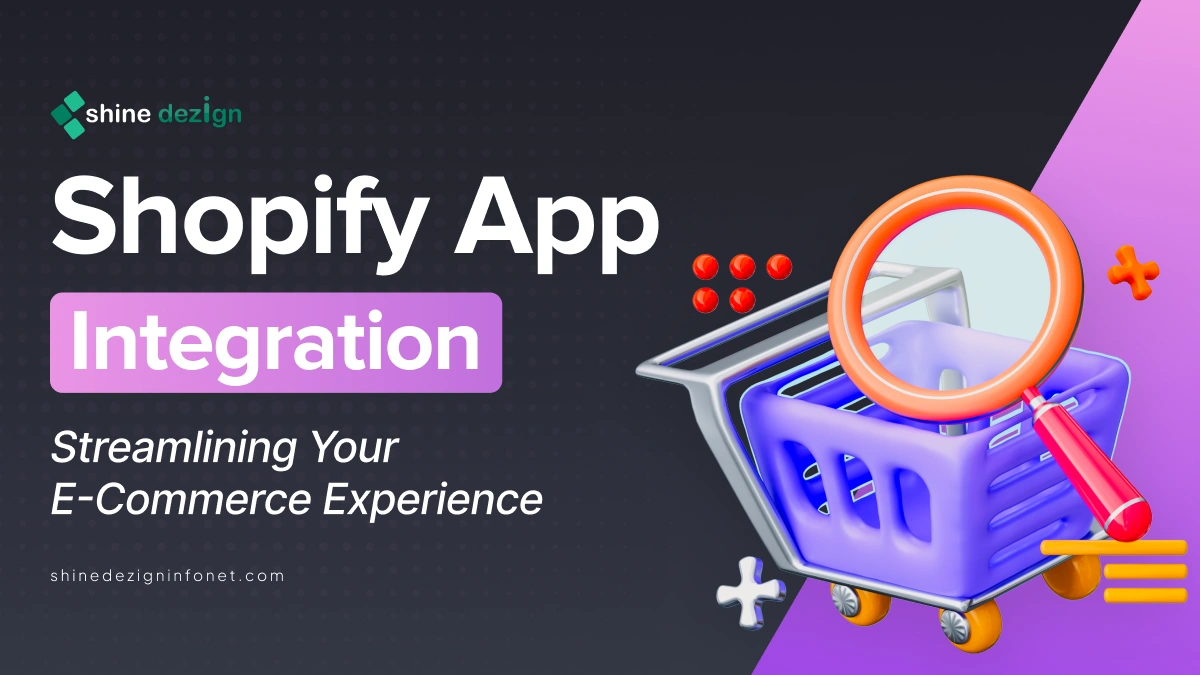Table of Contents
One such crucial aspect of your eCommerce store is the integration of apps into your Shopify store. Shopify App Integration allows merchants to extend the functionality of their online stores, providing a seamless and feature-rich experience for both merchants and customers alike. In this blog, we will explore the Shopify App Integration and How it will transform your e-commerce store.
Understanding Shopify App Integration
Shopify App Integration refers to the process of incorporating third-party applications into your Shopify store to enhance and customize its features. These apps can be installed directly from the Shopify App Store, offering a wide array of solutions to address specific business needs and challenges.
Here’s a more detailed breakdown of the key aspects of Shopify App Integration:
Shopify App Store:
The Shopify App Store is an online marketplace where store owners can explore and choose from a diverse range of applications.
Apps on the Shopify App Store are developed by third-party developers and businesses to extend the functionalities and features of a Shopify store.
Types of Apps:
The apps available on the Shopify App Store cover a wide range of functionalities, including marketing, sales, customer support, inventory management, analytics, and more.
These apps can help businesses streamline processes, automate tasks, and provide an enhanced shopping experience for customers.
Installation Process:
-Shopify API Integration is a straightforward process. Once you find a suitable app in the App Store, you can click to install it.
The app installation usually involves granting permissions for the app to access certain data and perform specific actions within your Shopify store.
Customization and Configuration:
After installation, many apps provide customization options to tailor their functionality to your specific business needs.
Store owners can configure settings, choose preferences, and personalize the app’s appearance to ensure seamless integration with their existing store design.
Types of Shopify App Integrations
A. Payment Gateways:
Smooth and secure payment processing is fundamental to any e-commerce operation. Shopify API integration offers a variety of payment gateways, but integrating additional ones can be crucial for reaching a broader customer base. Popular payment gateway apps include Stripe, PayPal, and Square, ensuring your customers have various payment options at their disposal.
B. Shipping and Fulfillment:
Efficient order fulfillment and accurate shipping are vital components of a successful e-commerce business. Integration with shipping apps like ShipStation or Shippo enables automated order processing, real-time shipping rate calculations, and tracking, streamlining the entire fulfillment process.
C. Inventory Management:
Maintaining accurate inventory levels is crucial to prevent overselling or stockouts is essential with E-commerce Integration with Shopify App. Inventory management apps like TradeGecko or Stocky seamlessly integrate with Shopify, providing real-time tracking, order management, and centralized control over your product listings.
D. Marketing and Sales:
Boosting sales and reaching a wider audience requires effective marketing strategies. The best Shopify Apps for Integration like Klaviyo or Omnisend offer email marketing automation, customer segmentation, and analytics tools to optimize your Shopify App marketing efforts and drive conversions.
E. Customer Support and Communication:
Building strong customer relationships is essential for e-commerce success. Apps such as Gorgias or Reamaze integrate with Shopify to streamline customer support, offering features like automated responses, ticketing systems, and live chat to enhance communication and resolve issues promptly.
Common Pitfalls to Avoid
1. Over-reliance on Too Many Apps:
One of the common mistakes of Shopify App integration is the over-reliance on a plethora of apps. While Shopify App developers can significantly improve functionality, including too many can lead to cluttered and complex systems.
Too many apps can slow down the loading times of your Shopify store, affecting user experience. Additionally, conflicting functionalities between different apps may arise, causing operational issues.
To mitigate this, carefully evaluate your business needs and choose only the apps that align with your specific goals. Opt for quality over quantity to maintain a streamlined and efficient store.
2. Neglecting Security Measures:
Another mistake of E-commerce Integration with Shopify App is neglecting security. Ignoring security measures can expose sensitive customer data to potential breaches, leading to server consequences for your business.
Make sure that the apps you select comply with industry security standards. Regularly update and monitor the Shopify App Security settings of each integrated app to address any vulnerabilities promptly. Prioritize the protection of customer information to build trust and safeguard your reputation. Security breaches not only compromise data but also damage the credibility of your online store.
3. Failure to Test Integrations:
Thorough testing of Shopify app integrations is a critical step that is sometimes overlooked. Failing to test an app before fully implementing it can result in unforeseen issues that may disrupt your business operations.
Conduct comprehensive testing to identify and address any potential conflicts or compatibility issues between the app and your existing systems. This includes testing user interfaces, data flows, and overall system performance.
4. Ignoring User Reviews and Ratings:
User feedback is a valuable resource when considering new apps for integration. Ignoring or neglecting user reviews and ratings can lead to unexpected challenges down the line.
Research the apps thoroughly and pay attention to what other users are saying about their experiences. User reviews often highlight specific strengths or weaknesses of an app that might not be apparent from its description.
By considering the experiences of other merchants, you can make more informed decisions about which apps align with your needs and deliver the desired outcomes for your Shopify store.
Conclusion:
While Shopify App Integration offers incredible opportunities for customization and improvement, it’s crucial to navigate the process carefully. By avoiding these common pitfalls, you can ensure a smooth integration experience that enhances your store’s functionality without compromising security or user experience. Also, you can hire Shopify App developers to enhance your e-commerce store and avoid unnecessary mishaps with your store.

















